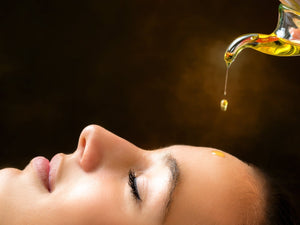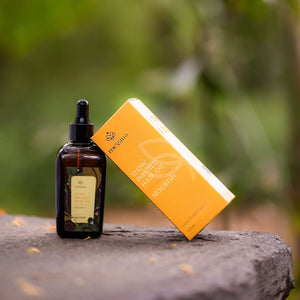Managing diabetes comes with its challenges—actively monitoring blood sugar, sticking to a strict diet, and taking medications on time. But there’s one frustrating side effect that doesn’t nearly get enough attention: hair loss, a source of concern and distress for many.
If you have noticed thinning strands or slower growth, it’s not just in your head; there’s a real connection between diabetes and hair loss. One must first understand why this happens and, most importantly, what you can do about it, with plenty of hair care tips and remedies right from the sacred grove of Ayurveda!
Understanding Diabetes: What Is It?
To understand the link between diabetes and hair loss, let’s first look at what diabetes does to your body.
Diabetes occurs when your body struggles to properly regulate blood sugar (glucose levels in the blood). There are two primary types:
- Type 1 Diabetes: The immune system attacks the insulin-producing cells in your pancreas.
- Type 2 Diabetes: The body becomes resistant to insulin or doesn’t produce enough of it.
Managing diabetes involves balancing blood sugar levels through:
- Regular monitoring
- A well-planned, low-glycemic diet
- Medications and lifestyle changes
It’s more of a balancing act, really! Though even with these measures, diabetes can affect various parts of the body, including hair, as it impacts circulation and metabolic health.

How Diabetes Affects Your Hair
Think of your hair follicles as tiny plants that need a steady supply of water and nutrients. For your hair, this nourishment comes from your blood. However, when blood sugar levels peak, diabetes can mess with blood circulation, cutting off the flow of oxygen and nutrients to your follicles. The result?
- Excessive hair loss/baldness
- Thinning strands
- Slow hair growth
And it isn’t just the hair on your head. Diabetes can affect hair growth all over your body, leaving some areas bare or patchy.
Making matters worse, diabetes wreaks havoc on scalp health. Dryness, dandruff, inflammation, and infections – all these issues amalgamate to make hair loss an even more significant concern.

Types of Diabetes-Related Hair Loss
People with diabetes generally experience different patterns of hair loss. Understanding these can help you identify their early onset and address them effectively:
-
Androgenetic Alopecia: Commonly referred to as male/female pattern baldness, this hair loss condition is influenced by genetics and hormones. Diabetes accelerates this condition, especially when blood sugar levels are consistently high. It disrupts normal hair growth.
-
Alopecia Areata: This autoimmune condition causes the immune system to mistakenly attack hair follicles, which then leads to patchy hair loss. It’s commonly observed in diabetic patients, as both conditions are linked to immune system dysfunction.
-
Telogen Effluvium: This occurs when more hair than usual enters the resting phase of the growth cycle. As a result, you may notice increased shedding, making the hair appear thinner. Diabetes-induced hormonal changes and stress often trigger this condition.
- Scalp Infections: High blood sugar creates an environment where fungal infections thrive. These infections can damage the scalp, weaken hair follicles, and contribute to hair loss if left untreated.
Ayurvedic Perspective on Diabetes and Hair Health
The ancient practice of Ayurveda regards hair loss as more than a cosmetic issue. It is a sign that your body’s balance is off. According to Ayurvedic scholars, healthy hair depends on a balanced metabolism, or ‘Agni,’ and muscular tissues, or ‘Dhatus.’
Diabetes throws these elements out of sync, especially Rasa Dhatu (the body’s nourishing fluid) and Majja Dhatu (bone marrow). When these factors are compromised, the imbalance weakens the hair’s foundation, leading to breakage, dullness, and shedding.
The good news is Ayurveda offers holistic solutions that address the root of this hormonal imbalance, not just the symptoms.
What You Can Do: Diabetes Hair Loss Treatment
Diabetes can make hair care a little trickier. However, managing and reclaiming your hair health is entirely possible. Here’s how.
1. Eat Good = Hair Great
It’s no secret that what you eat is vital in how your hair grows. Start with incorporating these nutrient-rich foods into your meals:
- Fruits: Apples, Guava, Oranges
- Vegetables: Cauliflower, Spinach, Gourds, Tomatoes
- Whole Grains: Oats, Millet, Whole Wheat
- Proteins: Lentils, Legumes, Paneer
- Healthy Fats: Ghee, Almonds, Flaxseeds, Pumpkin Seeds, Walnuts
Also, ensure you get enough iron (from leafy greens, legumes, and lean meats like chicken and mutton) and omega-3s (from chia seeds, walnuts, eggs, and fatty fish). These nutrients are essential for strong, healthy hair.
What to Avoid
Cut back on sugary desserts/snacks, processed foods, and refined carbs like white bread and white rice. Consider avoiding alcohol consumption and quitting smoking. And while hydration is key, sometimes overloading on water does more harm than good.
2. Try Ayurvedic Super-Herbs
Ayurveda offers a treasure trove of remedies to nourish your hair naturally:
- Amla (Indian Gooseberry): Eat it fresh, mix the powder into water, or sprinkle it on curd and salads.
- Coconut: Cook with coconut oil or use as a salad dressing. Fresh coconut pieces also make a good snack.
- Curry Leaves: Use them as a seasoning or turn them into a chutney with coconut and other spices to accompany your meals.
- Methi (Fenugreek Seeds): Soak them overnight, eat them in the morning, or blend the powder into stews or smoothies.
- Tulsi (Holy Basil): Brew it as tea or garnish fresh leaves to your soups, salads, and other dishes.
Besides promoting hair growth, these herbs boost your overall well-being from within, making them a win-win.
3. Rethink Your Hair Care Routine
-
Ditch excessive heat styling and chemical treatments—they weaken your hair further.
-
Regularly massage your scalp with oil to improve blood circulation and strengthen your roots.
-
Treat your hair to herbal masks with ingredients like Bhringraj, Brahmi, and Jatamansi.
- Explore Ayurvedic practices like Nasya to rejuvenate your scalp and five senses.
4. Keep Blood Sugar in Check
Managing your blood sugar levels is crucial, and it isn’t just for your hair. As mentioned, high blood sugar levels can lead to inflammation, affecting the hair follicles and leading to hair loss. Stay active with light exercises, like post-meal walks, practice meditation or yoga, and monitor your blood sugar levels regularly to keep things under control.
Meet MeVana, Your Ayurvedic Guru in Hair Care

Dealing with diabetes and hair loss can be a frustrating ordeal. But with early intervention and proper care, you can turn things around. Focus on nourishing your body with the right foods, utilise traditional Ayurvedic remedies, and stay consistent with a gentle hair care routine. And if you’re on the lookout for a personalised approach to diabetes hair loss treatment, MeVana is here to help.
Combining the wisdom of Ayurveda with modern science, MeVana creates personalised solutions tailored to your unique hair care needs.
-
MeVana Slow Infused Hair Oil: Packed with Ayurvedic herbs like Brahmi and Jatamansi, this oil nourishes your scalp and promotes growth.
-
MeVana Herb Laden Hair Cleanser: A paraben and sulfate-free shampoo infused with herbs like methi and turmeric to cleanse and restore balance.
- MeVana Moisturising Hair Conditioner: Rich with herbs like brahmi and yasthimadhu, it hydrates and further strengthens your hair, leaving it soft and shiny
Let MeVana’s hair care regimen guide you back to your hair’s natural balance and beauty—because every strand deserves utmost care!






